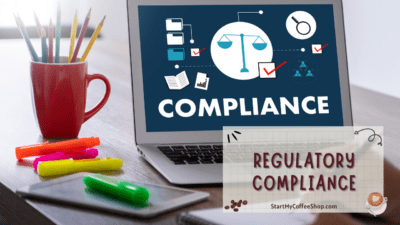Coffee shops have become an integral part of our daily lives, providing a cozy and vibrant space for people to socialize, work, or simply enjoy a delicious cup of coffee. Inspired by the allure of owning a coffee shop, many entrepreneurs embark on this exciting journey. However, like any business venture, opening a coffee shop comes with its fair share of risks.
Opening a coffee shop entails various risks like financial challenges and location selection, staffing issues, and regulatory compliance, thorough planning, and strategic decision-making are crucial to mitigate risks and increase the chances of improvement.
In this article, I will explore the potential challenges and risks associated with starting a coffee shop, while providing valuable insights and strategies to mitigate these risks.
Understanding the Market
Market research begins by analyzing the demand for coffee in your desired location. Is there a thriving coffee culture? Are people in the area frequent coffee consumers? By understanding the level of demand, you can determine if there is sufficient market potential for your coffee shop.

Evaluating the local competition is another essential aspect of market research. Identify existing coffee shops and assess their offerings, pricing, and overall brand positioning. This analysis helps you understand the competitive landscape and enables you to identify gaps or opportunities that you can capitalize on with your unique selling proposition.
Identifying your unique selling proposition (USP) is a key step in differentiating your coffee shop from the competition. What will make your coffee shop stand out? It could be a particular brewing technique, specialty beans sourced from a specific region, a unique ambiance, or a commitment to sustainability. By pinpointing your USP, you can create a compelling value proposition that attracts and retains customers.
Understanding the preferences and habits of your target audience is crucial for making informed decisions throughout the process. Are they interested in specialty coffee or do they prefer more traditional options? Are they looking for a quick grab-and-go experience or a cozy, sit-down atmosphere? By conducting surveys, interviews, or observations, you can gain valuable insights into their preferences, allowing you to tailor your offerings and create a customer-centric experience.
Read more about: Open a Coffee Shop Cost: Budgeting the Bean
Financial Considerations
Underestimating the initial costs of setting up a coffee shop can lead to financial difficulties in the early stages of operation. It is essential to conduct thorough research and create a detailed budget that covers expenses such as the lease or purchase of a space, renovation and interior design, equipment purchases, inventory, permits and licenses, marketing, and initial staffing. By accurately estimating these costs and including a contingency fund for unforeseen expenses, you can better prepare for the financial challenges that may arise.
Overestimating revenue is another financial risk that coffee shop owners need to be mindful of. Projecting overly optimistic sales figures without a realistic assessment of the market demand and competition can lead to financial strain. It is crucial to conduct market research, analyze the potential customer base, and consider factors such as location, pricing strategy, and target audience preferences. Creating a conservative revenue forecast based on realistic expectations can help manage this risk and ensure the financial stability of the coffee shop.
Unexpected expenses are an inherent part of running any business, and coffee shops are no exception. Equipment breakdowns, maintenance costs, inventory spoilage, or legal and compliance fees can emerge unexpectedly. It is important to allocate a portion of the budget for contingencies and maintain a financial cushion to address unforeseen expenses. Regularly reviewing and updating the financial plan can help identify and mitigate potential risks.
Seeking expert advice is invaluable when it comes to managing the financial aspects of a coffee shop. Consulting with an accountant or financial advisor can guide financial planning, budgeting, and tax obligations. Their expertise can help you make informed decisions and avoid potential pitfalls that may negatively impact the financial health of your coffee shop.
Considering different funding options is essential to secure the necessary capital for your coffee shop. These options may include personal savings, loans from financial institutions, partnerships, or seeking investors. Each funding option has its advantages and risks, and it is important to evaluate them based on your specific circumstances and goals. Carefully assessing the terms and conditions, interest rates, repayment terms, and potential impact on your financial stability is crucial in choosing the most suitable funding option.
Location and Lease Agreement
Foot traffic is an essential consideration for a coffee shop as it directly affects the number of potential customers passing by your establishment. Analyzing pedestrian flow in different areas, particularly during peak hours, can help identify locations with high foot traffic. Choosing a location near shopping centers, office buildings, or educational institutions can attract a steady stream of customers.
Accessibility is another critical aspect to consider. A location that is easily accessible by both pedestrians and vehicles can attract a broader customer base. It is important to evaluate the proximity of public transportation, parking facilities, and the ease of navigation for customers. Customers are more likely to visit a coffee shop that offers convenience and hassle-free access.
Parking availability is particularly important for customers who prefer to drive to your coffee shop. If there is limited parking space or no nearby parking options, potential customers may be deterred from visiting your establishment. Assessing the availability of parking spaces nearby or providing dedicated parking for customers can mitigate this risk.
Proximity to complementary businesses can also be advantageous. Being located near businesses that align with your target markets, such as bookstores, offices, or gyms, can attract customers who are likely to be interested in your offerings. Additionally, nearby complementary businesses may provide opportunities for collaborations or cross-promotions, further enhancing your visibility and customer reach.
When considering potential locations, negotiating a favorable lease agreement is crucial. Engaging with a professional real estate agent or lawyer can help ensure that the terms and conditions of the lease are fair and protect your interests. Understanding the lease duration, rent escalation clauses and any additional costs or obligations will help you make an informed decision and avoid potential financial risks in the long run.
Staffing Challenges

The recruitment process plays a vital role in assembling a skilled team. It is important to thoroughly evaluate candidates’ qualifications, experience, and interpersonal skills during the hiring process. Conducting comprehensive interviews, checking references, and assessing their ability to work in a fast-paced and customer-centric environment are essential steps. By being diligent in the hiring process, you can reduce the risk of high turnover and ensure that you are bringing in individuals who are passionate about delivering exceptional service.
Once you have selected your team members, ongoing training is crucial for their professional development and to maintain a high level of service quality. Provide comprehensive training on coffee brewing techniques, menu items, customer service protocols, and hygiene practices. This will equip your team with the necessary skills to consistently deliver excellent coffee and provide exceptional customer experiences. Additionally, organizing periodic refresher courses and workshops can help them stay updated with industry trends and enhance their skills.
Creating a positive work environment is key to attracting and retaining talented employees. Foster a culture of respect, collaboration, and open communication. Encourage teamwork and recognize individual achievements. By establishing a supportive atmosphere, you can boost employee morale, and job satisfaction, and reduce turnover. Regularly seek feedback from your team members and address their concerns promptly. This will not only contribute to a more cohesive and motivated team but also create a positive workplace that customers will notice and appreciate.
It is also important to prioritize work-life balance for your employees. Long working hours and demanding schedules can contribute to burnout and increase the risk of turnover. Implement fair scheduling practices, provide adequate breaks, and offer flexible shifts where possible. Showing consideration for your team’s well-being will result in a happier and more motivated workforce, ultimately enhancing the overall customer experience.
Monitoring and evaluating employee performance is essential to ensure consistency and address any areas that require improvement. Implement performance evaluations and provide constructive feedback to help your team members grow professionally. Recognize and reward exceptional performance to further motivate and retain valuable employees. This proactive approach will not only contribute to the progress of your coffee shop but also create a culture of continuous improvement.
Read more about: Open a Coffee Shop Business Plan: From Startup to Caffeine Oasis
Operational Considerations
Operating a coffee shop involves numerous day-to-day risks that require diligent management. These risks encompass areas such as inventory management, equipment maintenance, ensuring consistent quality, and effectively managing customer expectations. By establishing standard operating procedures, implementing quality control measures, and staying updated with industry trends, these operational risks can be mitigated.
Inventory management is a critical aspect of running a coffee shop. It involves monitoring and replenishing supplies of coffee beans, dairy products, pastries, and other ingredients. Inadequate inventory management can result in product shortages, leading to dissatisfied customers and lost sales. On the other hand, overstocking can lead to wastage and increased expenses. By closely monitoring inventory levels, forecasting demand, and establishing efficient ordering systems, you can maintain an optimal balance, reduce waste, and ensure smooth operations.
Equipment maintenance is essential for the smooth functioning of a coffee shop. Coffee machines, grinders, refrigerators, and other equipment must be regularly inspected, cleaned, and serviced to prevent breakdowns and ensure consistent quality. A proactive approach to equipment maintenance can minimize the risk of unexpected failures during peak hours, which could disrupt operations and disappoint customers. Implementing a maintenance schedule, training staff on proper equipment handling, and promptly addressing any issues can help mitigate these risks.
Consistency is key when it comes to the quality of your coffee and other offerings. Customers expect a consistent experience every time they visit your coffee shop. However, maintaining consistent quality poses its own set of risks, including variations in brewing techniques, ingredient quality, and staff performance. Developing standard operating procedures that outline precise measurements, brewing methods, and quality control checks can help ensure that each cup of coffee meets the desired standards. Regular staff training and feedback sessions can also contribute to maintaining consistent quality across the board.
Managing customer expectations is crucial for customer satisfaction and loyalty. Miscommunication, long wait times, or unsatisfactory customer service can lead to negative reviews, decreased customer retention, and damage to your reputation. By setting clear expectations, providing accurate information, and training staff on effective communication and conflict resolution, you can minimize these risks and foster positive customer experiences.
Marketing and Branding
Thorough market research is a vital starting point when developing a marketing strategy for your coffee shop. By understanding your target audience, their preferences, and their behaviors, you can tailor your marketing efforts to effectively reach and engage with them. This research will help you determine the most appropriate channels to invest in, whether it be online advertising, print media, local events, or community partnerships.
Utilizing social media platforms can be an effective and cost-efficient way to connect with your target audience. Establishing a strong online presence through platforms such as Facebook, Instagram, and Twitter allows you to engage with your customers, share updates, and showcase your unique offerings. By creating visually appealing content, responding to customer inquiries, and actively participating in online conversations, you can build brand awareness and loyalty.
Creating unique branding initiatives can also set your coffee shop apart from the competition. Develop a compelling brand story that resonates with your target audience and showcases the values and mission of your business. Consider incorporating elements such as distinct interior design, a memorable logo, and a carefully curated menu that reflects your brand’s personality. Implementing loyalty programs, hosting special events, or partnering with local artists or musicians can further differentiate your coffee shop and create a memorable experience for customers.
It is important to monitor and evaluate the effectiveness of your marketing efforts regularly. This allows you to identify areas of improvement, make necessary adjustments, and allocate resources wisely. Implement tracking mechanisms, such as unique promotional codes or customer surveys, to measure the impact of specific marketing initiatives. By analyzing the data and insights gathered, you can make data-driven decisions and refine your marketing strategies over time.
Adaptability is crucial in the fast-paced world of marketing. Consumer preferences and trends can change rapidly, and it is essential to stay agile and responsive. Continuously monitor market trends, keep an eye on your competition, and gather feedback from your customers to identify shifts in demand or emerging opportunities. This enables you to adapt your marketing strategies and offerings accordingly, ensuring that you stay relevant and appealing to your target audience.
Regulatory Compliance

Compliance with local, state, and federal regulations is a critical responsibility for any coffee shop owner. Failure to meet health, safety, and licensing requirements can have serious consequences, ranging from financial penalties to the potential closure of your business. Understanding and adhering to regulations related to food safety, employment practices, and permits are essential steps to mitigate these risks and ensure the long-term growth of your coffee shop.
One of the most significant areas of compliance in the food industry is food safety. It is crucial to understand and follow proper food handling, storage, and preparation procedures to prevent foodborne illnesses. This includes maintaining proper hygiene, implementing appropriate cleaning practices, and ensuring safe storage of ingredients. Regular training of staff members on food safety practices is vital to minimize risks and maintain a safe environment for both employees and customers.
Another important aspect of compliance is adhering to employment practices and labor laws. This involves understanding regulations related to employee rights, fair wages, working hours, and other labor-related considerations. Creating clear and comprehensive employment contracts, providing a safe and inclusive work environment, and complying with minimum wage laws are essential for mitigating legal risks and fostering a positive workplace culture.
Obtaining the necessary permits and licenses is another critical element of regulatory compliance. These may include health permits, occupancy permits, liquor licenses (if applicable), and other specific permits required by local authorities. Ensuring that all necessary permits are obtained and renewed on time demonstrates your commitment to compliance and helps avoid legal issues.
Staying updated with changing regulations is an ongoing responsibility. Laws and regulations related to the food industry and business practices can evolve. It is essential to regularly review and understand any changes that may affect your coffee shop. This can be achieved by seeking legal advice, attending industry conferences or seminars, and staying informed through reliable sources such as government websites or industry associations.
Read more about: Online Coffee Shop Business Plan: The Virtual Barista’s Playbook
Unforeseen Challenges
In the ever-changing landscape of the coffee shop industry, even the most meticulous planning cannot completely shield you from unforeseen challenges. External factors, ranging from economic downturns to shifting consumer preferences, can significantly impact your business operations. Moreover, unexpected events like a pandemic can pose unprecedented risks. To navigate through these uncertainties, it is essential to maintain flexibility, adaptability, and a well-thought-out contingency plan.
Economic downturns can have a direct impact on consumer spending habits, including their discretionary spending on coffee and café experiences. During these times, it is crucial to monitor market trends and adapt your offerings accordingly. This may involve adjusting your pricing strategy, introducing value-added promotions, or exploring alternative revenue streams such as online sales or partnerships with local businesses.
Consumer preferences can change rapidly, driven by evolving trends, health considerations, or shifts in lifestyle choices. Staying attuned to these changes and being proactive in meeting customer demands can help mitigate risks. Regularly engage with your customer base through surveys, social media, or in-store feedback to gather insights on their evolving preferences. By staying informed, you can make necessary adjustments to your menu, introduce new products, or enhance the overall customer experience.
The occurrence of unexpected events, like a pandemic, can have far-reaching consequences for the coffee shop industry. It is essential to have a robust contingency plan in place that addresses various scenarios. This may involve implementing health and safety protocols, pivoting to takeout and delivery services, enhancing your online presence, or diversifying your revenue streams. Being prepared for such events can help your coffee shop weather the storm and remain resilient during challenging times.
Flexibility and adaptability are key attributes for any coffee shop owner. It is important to embrace change, be open to new ideas, and be willing to adjust your strategies when necessary. This could mean experimenting with new brewing techniques, incorporating seasonal offerings, or introducing innovative loyalty programs. By continuously evolving and adapting, you can stay ahead of the curve and mitigate risks associated with industry changes.
Summary
Opening a coffee shop can be an incredibly enjoyable venture, but it’s essential to be aware of the potential risks involved. By understanding the market, carefully managing finances, selecting the right location, building a skilled team, implementing effective operational strategies, investing in marketing and branding, ensuring regulatory compliance, and staying adaptable, entrepreneurs can navigate the risks and increase their chances of improvement. Remember, every risk can be turned into an opportunity with proper planning, perseverance, and a passion for serving exceptional coffee experiences.
Frequently Asked Questions

1. What are the financial risks involved in opening a coffee shop?
Opening a coffee shop comes with financial risks such as underestimating initial costs, overestimating revenue, and facing unexpected expenses.
2. How can I choose the right location for my coffee shop?
Consider factors like foot traffic, accessibility, parking, and proximity to complementary businesses. Conduct market research and evaluate different options to make an informed decision.
3. What staffing challenges should I anticipate?
Staffing challenges in a coffee shop can include high turnover rates, training costs, and maintaining consistent service quality. Implementing a rigorous recruitment process, providing ongoing training, and creating a positive work environment can help mitigate these challenges.
To learn more on how to start your own coffee shop, check out my startup documents here.
Disclaimer: The information provided by StartMyCoffeeShop.com (“The Site”) is for general informational purposes only. All information on the Site is provided in good faith. However, we make no representation or warranty of any kind, express or implied, regarding the accuracy, adequacy, validity, reliability, availability, or completeness of any information on the Site. Under no circumstance shall we have any liability to you for any loss or damage of any kind incurred as a result of the use of the Site or Reliance on any information provided on the Site. Your use of the Site and reliance on any information on the Site is solely at your own risk. This blog post is for educational purposes only and does not constitute legal advice. Please consult a legal expert to address your specific needs. Terms and Conditions. (https://startmycoffeeshop.com/terms-and-conditions/)

Hi! I’m Shawn Chun
My adventure in coffee began when I first launched my first coffee shop back in the early 2000s. I had to figure out so many things on my own and to make it worse within 2 years of opening two large corporate coffee chains moved in just blocks away from me!
As I saw smaller and even some larger coffee shops in the neighborhood slowly lose customers to these giant coffee chains and slowly close up shop, I knew that I had to start getting creative…or go out of business.
I (like you may be) knew the coffee industry well. I could make the best latte art around and the foam on my caps was the fluffiest you have ever seen. I even had the best state-of-the-art 2 group digital Nuova Simonelli machine money could buy. But I knew that these things alone would not be enough to lure customers away from the name brand established coffee shops.
Eventually, through lots of trial and error as well as perseverance and creativity I did find a way to not only survive but also thrive in the coffee/espresso industry even while those corporate coffee chains stayed put. During those years I learned to adapt and always faced new challenges. It was not always easy, however, in the end, I was the sole survivor independent coffee shop within a 10-mile radius of my location. Just two corporate coffee chains and I were left after that year. All told the corporate coffee chains took down over 15 small independent coffee shops and kiosks and I was the last one standing and thriving.
Along the years I meet others with the same passion for coffee and I quickly learned that it is not only “how good a barista is” that makes a coffee shop successful, but the business side of coffee as well.
Hence why I started this website you are on now. To provide the tools and resources for up and coming coffee shop owners to gain that vital insight and knowledge on how to start a coffee shop successfully.
Stick around, browse through my helpful blog and resources and enjoy your stay! With lots of LATTE LOVE!
Shawn







